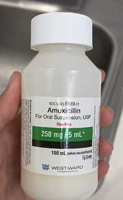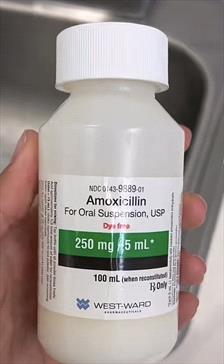
YouTube screenshot

YouTube screenshot
Amoxicillin is a first-line antibiotic given by mouth in the form of a tablet, capsule, or liquid suspension. Veterinarians commonly use it to treat skin, respiratory and urinary tract infections.
Veterinarians, like physicians, are preparing as supply interruptions unfold for liquid amoxicillin, a first-line antibiotic that's commonly prescribed to treat bacterial infections in humans and other animals.
Much of North America is facing a shortage of amoxicillin in addition to other prescription drugs. In recent weeks, the antibiotic reportedly has become difficult to find in U.S. and Canadian retail pharmacies.
The supply issue mostly impacts amoxicillin in suspension form; for now, tablets still are readily available. But the antibiotic's powder form, dissolved in water to create a suspension, often is better suited for children and animals such as dogs, cats and birds, in part because the liquid formulation can be flavored and more easily ingested. It also allows for easier dosing adjustments.
According to the U.S. Food and Drug Administration, several of the nation's generic drug manufacturers — Hikma Pharmaceuticals, Aurobindo Pharma, Teva, Rising Pharmaceuticals and Novartis' Sandoz unit — reported limited supplies of amoxicillin oral powder for suspension. On Oct. 28, the agency listed amoxicillin oral solution in its drug shortage database, which notes that shortages can occur for many reasons "including manufacturing and quality problems, delays, and discontinuations." There also have been reports of high demand for amoxicillin due to respiratory illnesses.
Backorders are being reported at human pharmacies, where veterinary clients often fill prescriptions. However, many online pet pharmacies show veterinary versions of liquid amoxicillin in stock and ready to ship. A search today on pet pharmacy sites Chewy and 1-800-PetMeds shows oral suspension amoxicillin in stock by Virbac, which makes BioMox for dogs, and Zoetis, which makes Amoxi-Drop for dogs and cats.
"Our inventory for these products are in good shape, and we are not anticipating any supply issues," Bill Price, vice president of Zoetis corporate communications, confirmed by email.
On the Veterinary Information Network, an online community of the profession and parent of the VIN News Service, Dr. Patrick Simonsen of LeMars, Iowa, said he's stocking up amoxicillin for fear of not being able to find it. "First thing I did when I got to the clinic was check our amoxicillin supply and then ordered what I could," he wrote on a message board.
Dr. Robert Clipsham of West Lake Village, California, said he's doing the same, sharing that he's found it difficult to find the suspension form of amoxicillin in combination with clavulanic acid, which works to prevent bacteria from destroying the antibiotic. "[It] took two days and multiple pharmacies to locate a source for the client, 15 miles from the original pharmacy," he wrote.
Accumulating a cache of hard-to-find drugs is a common coping strategy, but it can exacerbate shortages, according to the FDA.
A report by the FDA Drugs Shortages Task Force, published in 2019 and updated in 2020, notes tension between providers and drugmakers over shortages. "Health care providers ... would like more transparency through the supply chain to identify reliable manufacturers, anticipate shortages before they occur .... By contrast, the pharmaceutical industry regards even the location of their manufacturing facilities as confidential commercial information and claim that keeping this information private is a matter of supply security."
Supply chain issues
Amoxicillin is one of many human drugs commonly prescribed in veterinary medicine that have come into short supply in recent months, including furosemide injection (a diuretic), bupivacaine (a local anesthetic agent), iohexol (a radiographic contrast agent) and dextrose (a simple sugar that's chemically identical to glucose in blood sugar).
Supply chain troubles are common for veterinary drugs. A decade ago, practitioners were frustrated by a shortage of popular antiparasitics made by Novartis. In 2017 and again in 2021, backorders of key euthanasia drugs had veterinarians trying to stretch their stock. Apoquel, an anti-itch drug by Zoetis, has been backordered periodically for years.
Drug manufacturers often blame drug shortages on pharmaceutical supply chain disruptions, whether it's a lack of raw materials or another production woe. Since the pandemic's start in 2020, Covid-19 has added to the pressure.
China, the world's biggest supplier of source materials that go into developing active pharmaceutical ingredients, periodically shutters regions of the country in response to Covid outbreaks, closing manufacturing facilities in the process. Officials also periodically cut electricity to regions of the country in response to extreme weather and higher residential consumption that challenges power grids. The rationing has forced many factories to reduce hours or halt operations, which further slows supply chains.
"The supply chain is tough for everyone," said a pharmaceutical insider who asked not to be identified, for fear of harming the company's already-strained relationship with suppliers. "We've been stocking larger supplies to protect our supply chain, but there have been challenges, and it comes out of China."
Changing prescribing behaviors
Dr. Yaiza Forcada, an internal medicine specialist in Amsterdam and a VIN consultant, said there's an upside to antibiotic scarcity: It helps to prevent overuse, a core principle of antimicrobial stewardship.
"We had this [issue] in Europe a few times in the last years," she said, referring to a shortage of amoxicillin and other drugs. "We had to select other antibiotics and be more selective with who received the little stock that we sometimes got."
Being more selective also guards against overusing antibiotics. Too-liberal use of such drugs can hasten the evolution of resistance in pathogens, making infections harder, and potentially impossible, to treat. The World Health Organization recognizes antimicrobial resistance as one of the world's greatest threats. Considering the specter of drug resistance, Forcada looked upon the product shortage philosophically.
"All in all, I did not see it as a bad thing," she concluded, "as it made us realize more and more how it would be to live without certain types of antibiotics."